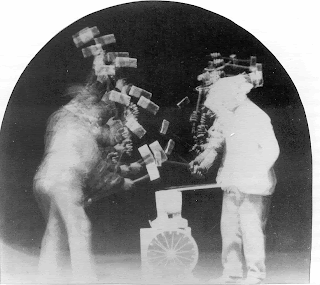Considerations of the impact of industrial technologies are easy to find, but most of these are laudatory and generally focus on decreases in cost and increases in quantity, often overlooking the human impact and the significant problems that arise from uncritical overproduction - one of the specific critiques made in 1888 by Edward Bellamy in Looking Backward.
Early films like Fritz Lang's 1927 silent classic Metropolis demonstrate an early concern for the mechanizing impact of technology on human bodies as well as the efforts of owners to control workers via technological means. The contemporary relevance of Metropolis is suggested by its 2010 digital restoration.
Chaplin's semi-silent 1936 film Modern Times provides a more amusing reflection on the simultaneous mechanization of industry and man, as directed by owners and managers. Thought the film dialog could have been completely featured in sound, Chaplin choses to give only certain characters a voice - note who and reflect on the significance of this.
We've all enjoyed the bountiful (if often excessive) benefits of industrial production, but it's significant drawbacks have become normalized and its toll on us, invisible. As French philosopher Jacques Ellul notes in The Technological Society, the goal of technology is the precise, efficient result and the unpredictable embodied human must be subdued for this: "To the degree that technique must attain its result with mathematical precision, it has for its object the elimination of all human variability and elasticity."
The connection to radio may be obvious, celebrating the variable and elastic nature of freeform radio, but a larger insight might be gained from brief reflection, at a greater distance, upon the history of our species. Technology has made our lives easier and more comfortable while simultaneously making us softer and less adaptable - and more rigid.
While forms, frameworks and systems are convenient technologies for organization and specific applications like mass production, they can become stifling bonds limiting creative exploration and problem-solving - like Blake's "mind-forged manacles" in his poem "Jerusalem."
While technologies have helped us to evolve, there may be a point at which our interaction with them is devolutionary, making us soft & unadaptable. Contemporary technological society requires increasing standardization and conformity on a variety of levels, but randomness, chance and mutation have been the drivers of human evolution - not predictable uniformity.








